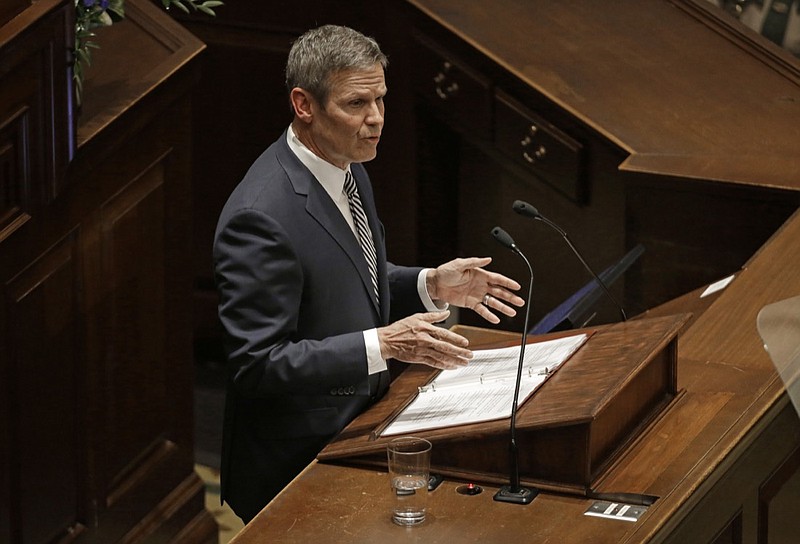NASHVILLE - Tennessee Gov. Bill Lee's controversial school voucher bill cleared its first legislative hurdle Tuesday after extensive debate, with several lawmakers saying they want more details and some provisions clarified.
The Republican-led House Curriculum, Testing, & Innovation Subcommittee approved the legislation on a voice vote, moving it along to full committee.
"I think this concept is a good concept," said House Education Committee Chairman Mark White, R-Memphis. "There [are] a lot of our students who need an opportunity to get away from where they've been."
But White also urged Lee administration officials to address some of the questions and concerns raised during the hour-plus discussion, saying, "let's make sure this thing is written right."
Lee's proposal would allow families in school districts with at least three public schools falling into the state's bottom 10 percent on student performance to get an average of $7,300 annually for taxpayer-paid "education savings accounts" for private schooling.
The program is seen as starting in fall 2021 with up to 10,000 students. It's restricted to six school districts - Hamilton, Davidson, Knox, Shelby and Jackson-Madison counties - as well as the state's Achievement School District.
Rep. Bill Dunn, R-Knoxville, a longtime voucher proponent who is carrying the administration's bill, said the issue comes down to "school choice" and the idea that "each child is a unique individual ... with unique needs."
Noting Lee campaigned on the issue in his successful 2018 race for governor, Dunn said, "I think it's obvious people agree with his approach." And he likened it to what happens in higher education when Tennessee students can take advantage of state lottery-funded scholarship programs and federal Pell Grant programs to attend public or private colleges.
Not everyone on the panel was on board.
Rep. Charlie Baum, R-Murfreesboro, said that while the legislation requires students using the money to take annual state assessments in math and English arts, it makes no allowances for science and social studies tests, which public school students must take in addition to math and English.
"I know everybody up here is for standards and accountability," Baum said, adding he believes proponents "would want to demonstrate" the program works.
He also noted that, although the program is aimed at students where there are lower-performing schools, it allows for parents of students attending better-performing schools to qualify if they meet income requirements.
"That's correct," said Brent Easley, Lee's legislative director.
Jim Wrye, chief lobbyist for the Tennessee Education Association that represents many public school teachers, testified that education savings accounts and more traditional voucher programs "have not been proven to improve education outcomes," according to two studies from Ohio and Louisiana "where they saw a significant loss of academic performance."
While there's "speculation" on why that was, Wrye said "the data is the data."
Among the teachers who helped pack the legislative committee room Tuesday was Jeanette Omarkhail, president of the Hamilton County Education Association and a county school system educator.
"This is not a good bill; it's not fleshed out," Omarkhail said after the hearing. She said she wished lawmakers would put further progress on hold and "get all the kinks worked out" before making it state law.
"Don't experiment on our kids," she said. "Kids have been experimented with enough."
Lee is proposing spending $125 million over five years, with the program likely to kick off in 2021 with up to 10,000 students and $75 million in cash on hand.
At the same time, the impacted public school districts would receive up to $25 million a year collectively over three years to make up for the loss of students. Public education funds are based on student enrollment.
Beginning in Year 4, the schools would receive $25 million for improvements at the state's bottom 5 percent of schools. But critics noted that's not actually in the law. It would depend on the budget process in future state spending plans.
According to an administration amendment, parents of students could receive up to $7,300 in state funds annually for education savings accounts, which differ from traditional vouchers that are given directly to private schools.
Parents or guardians would be in charge of the education savings accounts, although subject to state restrictions and potential auditing, and they could spend the money to help pay for private school tuition and education-related expenses.
Participation is pegged to incomes that are double the amount of the income to qualify for existing free or reduced-price lunch programs. That's $46,435 for a family of four to qualify for the lunch program, according to Tennessee Department of Education figures.
Doubling that takes it to $92,870 and up into the middle class for a family of four in Hamilton County, according to a Pew Research Center calculator.
The bill also has several provisions to deter fraud.
Contact Andy Sher at asher@timesfreepress.com or 615-255-0550. Follow him on Twitter @AndySher1.
